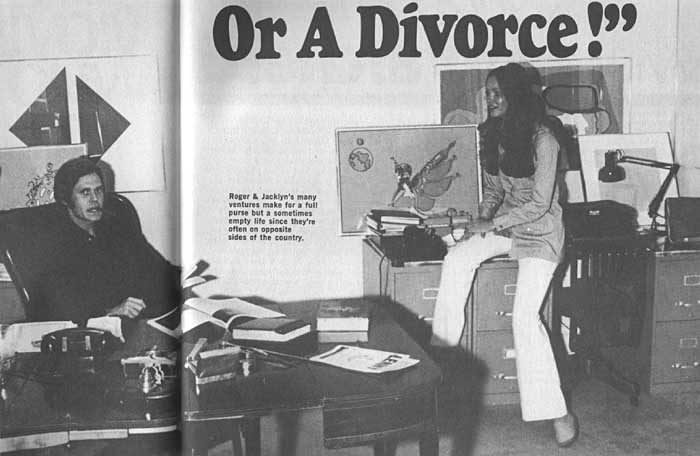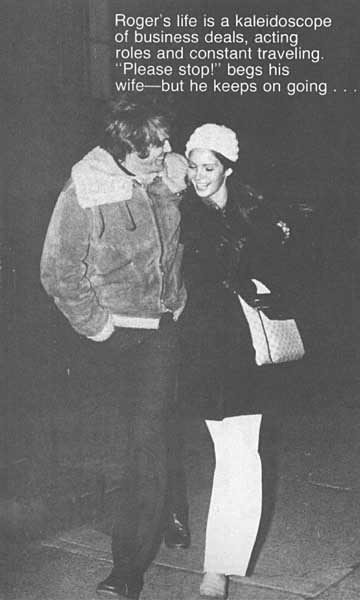- ROGER DAVIS: " WE'RE EITHER GOING
TO HAVE A CHILD OR A DIVORCE!"
- by Jill Cahill
- Photo Screen, November 1972

There
was no question about it--Roger Davis had it made. He was teaching
at the University of California, and had dabbled in just enough
in real estate so that his investments were paying off comfortably.
He was a bachelor--a handsome one at that--and his social life
seldom left time for loneliness.
But something significant was missing.
Roger Davis's dreams, no matter how fleece-lined his life seemed
to be, were going unrealized. His career in acting was all but
at a standstill. And that career was his real reason for being
in California in the first place.
He leaned back in the webbed lawn chaise
and shielded his eyes from the sun. What did it all mean? How
could you complain when you had things so easy? Isn't that the
final aim?
Bill Cosby was renting one of Roger's
houses. Several other homes Roger owned were just as impressively
rented. And, he couldn't deny that he loved the relationship he
shared with his students every day when he was in front of the
class instructing.
However, it wasn't enough. After weeks
of deliberation and soul searching, Roger Davis sold his interests
in Los Angeles, left his teaching post and returned to New York--baggage
and all.
"I couldn't see where I was making
any mark as an actor, and that was my main interest in life,"
he says now. "So I sold everything. Took a terrible loss,
but I knew I had to do it if I was going to get anywhere with
my real career."
Some months later, the once-confident
and comfortable Hollywood bachelor had serious doubts about his
decision:
"I was living then in a sixth floor
walk-up flat. It was dark and dreary and the cockroaches practically
took over.
"I had to wonder how in the world
a landlord could rent such a hole to anyone. One day I asked the
manager if he wasn't able to do something about the roaches. He
looked at me and laughed. His answer was, 'Roaches gotta live,
too, you know!'"
Since that time, nearly six years ago,
Roger Davis has found that his life is full of decisions and steps
sideways necessary to keep on the right path. Today, he says he
feels a certain kinship with Nina Van Pallandt, mystery song-stress
in the Clifford Irving-Howard Hughes case.
"Let's face it, whoever heard or
cared about her until she was linked with Irving and played such
a role in the testimony," Davis reasons. "That's kind
of how I feel--I relate to her anonymity. It took the death of
a good pal to bring me into the spotlight. Suddenly everyone wants
to talk to me, to know about me. And they can't help asking a
few questions about Pete, too."
Davis wasn't bluffing. Suddenly in the
midst of the interview he interjected, "Go ahead, you can
ask me about Pete, I don't mind."
It seemed uncanny. Presumably every reporter
to date had actually been more interested in Pete Duel and his
bizarre death than they were in Roger Davis, the actor who took
over Pete's role in Alias Smith And Jones.
Since he returned to New York in 1966,
Davis has worked arduously at his career. "But it seems as
though I've always been on the periphery, if you know what I mean,"
he grins.
He replaced an actor in the highly-touted
political satire, MacBird, in New York and finished out
the run to rave reviews. He met Bobby Kennedy shortly afterward
and Kennedy, in his boyishly affable manner, handed Davis quite
a compliment. "I understand you're very good as me,"
Davis recalls the statement, "but I understand that you interject
a little love."
 Soon
afterward, Robert Kennedy was shot. Davis felt crushed.
Soon
afterward, Robert Kennedy was shot. Davis felt crushed.
After MacBird, Davis' life took
on an even more bizarre tone. Dark Shadows, the daytime serial
filled with ghouls and vampires and strange creatures in the night,
was Davis' next acting gambit. "I started out as a love interest,
gradually became a ghoul, and eventually had my head cut off,"
he says matter-of-factly.
Around that time, though, some good things
were happening. Roger was in his agent's office and met one of
his associate's clients--a lovely young actress named Jaclyn.
Inevitably, they went to dinner and a month and a half later they
were married.
For the next three years they both kept
working,often in commercials, and frequently they were on opposite
sides of the country. One of Roger's accounts was in Denver, another
in Chicago and often he was on the West Coast, as he had signed
a contract with Universal Studios in Los Angeles.
And when Roger was selected for the role
of Hannibal Hayes [sic] on Alias Smith And Jones last year,
he regarded it as a fine stepping stone to his career--but Jaclyn
had other plans. She had apparently hoped that it would mean they
could finally settle down with a home and a family.
Jaclyn longed to step back from the high-pressured
world of the actress to become a mother. She had been looking
forward to having Roger's children since the day she was married.
Roger, however, had other ideas. An adventurous
man by nature, he relished the hours he spent rushing from one
city to another between jobs. He loved the hectic pace of the
career kaleidoscope. He owned a townhouse in New York as well
as Los Angeles and liked the option of living in one, then the
other. Roger's whole outlook was geared to travel and experiencing
new things...
For two years Jaclyn tried to convince
Roger that she was ready to live a quieter, more settled life.
But Roger would have none of it. She hinted subtly at first, but
later she approached the subject in serious discussion. Finally,
the matter became crucial. It reached the point where, as Roger
puts it: "We're either going to have a baby or a divorce!
"It's like this. We've been married
a little over two years. Does it seem abnormal to you that we
don't have children yet. After all, what's two years?
"But you see Jaclyn comes from Houston.
She's from a family of children-loving people. Like most parents,
they pressure her. And, I guess, she has the nesting instinct
or something.. She's very determined to start a family. She's
very provincial.
But me, well, I'm not so anxious. I like
to travel, like to be on the move. I know that as soon as we have
children, it means we have to stop a lot of the moving. And that
bothers me. I just don't see it."
It's another of those dilemmas that Roger
Davis will have to face squarely and honestly. Many youthful fathers
can tell him that children don't always have to tie a man down.
Sometimes they do, but it isn't always the case.
"In life I've found that sometimes
you have to take a step backward before you can move ahead on
the straight and proper path," he points out. "Like
in 1966 when I sold everything to start over again. I felt it
was necessary to get back on the right path. I'd forgotten about
my career, forgotten what was really important to me."
Now, at his young age, once again he'll
have to make that decision. He'll have to decide just how important
his feeling for Jaclyn is and how much he can accept a way of
life to which he isn't accustomed in order to hold on to the woman
he loves.
Because he is a responsible sort of man,
there seems no question that whatever decision is made, it will
be the best possible for both Roger and Jaclyn. Perhaps he will
give in and accept the inevitability of parenthood. It isn't half
bad, once it's upon a man; and Roger, by his own admission, usually
looks upon whatever he does in a positive manner. With that attribute
at hand, he can't help but enjoy fatherhood and ... domesticity.
"I do have a great amount of enthusiasm,"
Roger says. "I really do. In fact, Pete used to laugh at
me. He could never understand it. He always used to chide me about
always looking on the good side. Of course, what I never realized--none
of us did--was that Pete was on his way under. No wonder he couldn't
understand me."
Back
to Articles List

 Soon
afterward, Robert Kennedy was shot. Davis felt crushed.
Soon
afterward, Robert Kennedy was shot. Davis felt crushed.